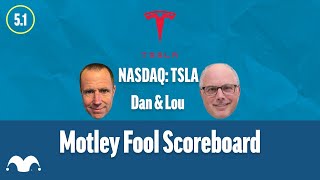Tesla (TSLA 2.23%) inspires both loyal fans and devout haters, but the stock's success is indisputable. Since its IPO 10 years ago, it has delivered amazing returns to its early shareholders. It's also built up an impressive company with a growing customer base, an expanding addressable market, and lofty aspirations.
Now that Tesla has achieved profitability, it's now just a matter of time before it gets an invitation to join the S&P 500 Index (^GSPC 1.23%). However, while admission to that club is based largely on objective criteria, the same isn't true for the Dow Jones Industrial Average (^DJI 1.20%). As crazy as it might seem, there's an increasingly compelling case for Tesla to join that elite band of 30 companies. Dow. Here are some of the best reasons why.

Image source: Tesla.
1. An industrial average needs a car company
As its name suggests, the Dow was initially focused on industrial companies, and for over a century, the auto industry had representation in the average. That started with the admission of the American Car and Foundry Company in 1901, and at various times, companies like Studebaker, Nash Motors, and Chrysler were members of the Dow.
The longest-tenured car company in the Dow was General Motors (GM 3.44%), which had uninterrupted membership from 1925 to 2009. However, its bankruptcy following the financial crisis led to its removal. Since then, the Dow has gone more than a decade without representation from the auto industry.
Many investors note that Tesla's potential goes well beyond its vehicle manufacturing. For now, though, Tesla is squarely focused on cars and trucks. That makes it an industrial stock, and getting it into the Dow would make the average more industrial once again.
2. Tesla's market capitalization would put it in the top 10 among Dow stocks
There's no market cap requirement for admission to the Dow, as the managers of the index generally seek companies that are representative of the broader economy rather than simply picking the biggest businesses available. However, Tesla's market cap has flirted with $300 billion recently, and that establishes the automaker as a leader in its field.
If Tesla were in the Dow, it would rank among the 10 companies with the largest market caps. It's also nearly nine times more valuable than the Dow stock with the lowest market cap, and it would have a nearly $100 billion margin of safety just to keep it out of the bottom half. Even those who argue that a correction for Tesla stock is long overdue have to admit that the company's size currently warrants giving it consideration for the industrial index.
3. The one real barrier is easily fixable
Just about the only reason why Tesla shouldn't be in the Dow right now is that the average uses a price-weighted methodology in calculating its level. Because its share price has climbed well into four-digit territory, Tesla would have a much larger weighting in the Dow than any other stock.
However, there's precedent for companies with high share prices taking steps that eventually eased their path into the Dow. In the mid-2010s, Apple (AAPL 0.21%) stock climbed into the high-triple digits, which would've kept the iPhone giant out of the Dow. So Apple did a 7-for-1 stock split that brought its share price down to a much more manageable level.
A similar 7-for-1 split would put Tesla's stock in the $200 to $250 range based on recent prices. That would give it a substantial weighting in the average, but not an overwhelming one. If Tesla did a 10-for-1 stock split instead, it would find itself squarely in the middle of the index's pack in terms of share price.
Don't hold your breath
Objectively, there are compelling reasons why Tesla deserves a spot in the Dow Jones Industrial Average. Practically, though, the move seems unlikely. The Dow represents old-school Wall Street in a way that CEO Elon Musk would likely reject out of hand.
It's possible that eventually, Tesla could still get an invitation. But it's much more likely that Dow investors will have to go without an auto stock in the index for a while longer.










